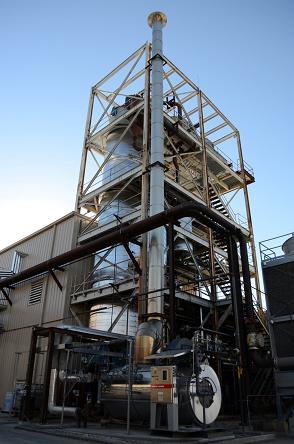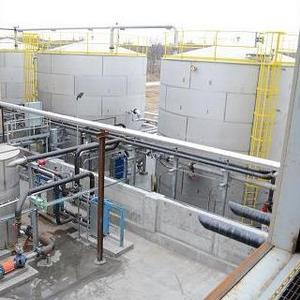Blue Sun launches commercial-scale enzymatic biodiesel process



Photo: Steve Bond, Blue Sun Biodiesel
January 16, 2014
BY Ron Kotrba
Blue Sun Energy announced the implementation of the company's new enzymatic biodiesel processing technology at its 30 MMgy production facility in St. Joseph, Mo.
“We have fully commercialized the enzymatic process technology and the plant is operating at full commercial scale,” said Blue Sun CEO Leigh Freeman. “This process gives Blue Sun a clear competitive advantage in the market, allowing us to bring the absolute highest quality fuel to market using this industry leading technology. This achievement again shows Blue Sun’s ability to identify and commercialize the most relevant advanced technologies in fuel production.”
The process at the St. Joe refinery produces high-quality biodiesel, the company says, which is further improved by its state-of-the-art distillation system installed last year.
Advertisement
Advertisement
“The process developed by Blue Sun for enzymatic transesterification improves the bottom line through lower costs and higher revenue,” said Sean Lafferty, vice president of technology and new business. “Blue Sun can use essentially any feedstock without limit to free fatty acid content. This reduces pretreatment requirements and costs significantly. Blue Sun’s feedstock advantage alone can yield a savings of 10 cents per pound of feedstock, or 75 to 80 cents lower cost per gallon of finished biodiesel.”
Blue Sun’s process is more efficient in methanol recovery and use, further reducing costs. Also, the value of the glycerin produced is much higher than in standard biodiesel operations—20 to 30 cents per pound versus less than 10 cents per pound traditionally.
Blue Sun engineers developed a unique proprietary process for enzymatic biodiesel production. This was necessary to overcome the hurdles typical in an entirely new manufacturing process.
“Commercial operations using the enzyme would not have been possible without the many discoveries and inventions of the skilled engineers at Blue Sun, and the support of our partner, Novozymes,” said Bruce Baughman, chief operations officer.
Advertisement
Advertisement
This new process utilizes Novozymes’ Callera Trans L enzyme.
The company says this implementation represents yet another commercialization achievement for Blue Sun, which established the first high-quality biodiesel specification and in 2004 introduced the most advanced biodiesel under the trademarked brand Fusion.
Blue Sun says it will soon announce its next technology breakthrough, a major milestone in renewable diesel.
Related Stories
Neste Corp. on July 24 released second quarter results, reporting record quarterly renewable product sales volumes despite weaker margins. SAF sales were up nearly 80% when compared to the first quarter of 2025.
Valero Energy Corp. on July 24 released second quarter results, reporting a profitable three-month period for its ethanol segment. The renewable diesel segment posted a loss, but the company’s new sustainable aviation fuel (SAF) unit operated well.
The IRS on July 21 published a notice announcing the 2025 calendar-year inflation adjustment factor for the Section 45Z clen fuel production credit. The resulting adjustment boosts maximum the value of the credit by approximately 6%.
U.S. Secretary of Agriculture Brooke L. Rollins today announced the reorganization of the USDA, refocusing its core operations to better align with its founding mission of supporting American farming, ranching, and forestry.
The U.S. Department of Energy’s Office of Energy Efficiency and Renewable Energy is soliciting public comments on a preliminary plan for determining provisional emissions rates (PER) for the purposes of the 45Z clean fuel production credit.
Upcoming Events










